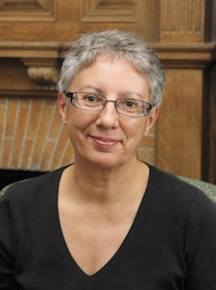By Alexis Boyd
Preparing to write this article, I was dismayed to find that the footage of my conversation with Phi Beta Kappa Visiting Scholar Hazel V. Carby, the Charles S. Dilly professor of African-American Studies and director of the Initiative on Race, Gender, and Globalization at Yale University, had deleted. I had only my memory and scattered, nearly illegible, notes to recreate an incredibly thought-provoking lecture. Yet, after I spent too many minutes mourning the lost recording, I could not help but think that it was strangely fitting that our conversation was lost to cyber-space when considering the topic of Carby’s presentation, “Black Futurities: Shape-Shifting Beyond the Limits of the Human (a Reconsideration of What We Mean by Afrofuturism)”.
I had only a vague idea of the drive behind the Afrofuturist intellectual and creative movement. So entering my meeting with Carby, a couple of hours before the lecture, I was unaware of the ways in which the genre needed to be reconsidered. However, Carby, with a soft-spoken but firm, “I do not believe I use the term, ‘Afrofuturism,’” guided me to my own understanding of the gaps within the genre.
We discussed the latent and inherent patriarchal ideologies that color, and even motivate, many Afrofuturist works. We spoke of the rhetoric of value and commodification that surrounds representations of the black female body that lies at the core of numerous Afrofuturist narratives. Carby asserted that Afrofuturism does not encompass the complexities of the works of the female authors, artists, and intellectuals who are also concerned with black imaginings of the future. After listening to and speaking with her, I could not help but agree.
During our conversation, Carby disclosed her goal to challenge the audience to do their own interpretive work. She had no intention of telling us what we were supposed to think about the intense combination of visual, auditory, and verbal stimuli. She encouraged me to develop my own interpretation of the faceless figures of Jacob Lawrence’s Migration Series and the “Ode to London” shifting to the layered works of Ellen Gallagher’s Watery Ecstatic against a quiet reading of Octavia Butler’s Bloodchild. Watching, listening, and experiencing the various sights, sounds, and stories of “Black Futurities,” I could not help but think that, even as I felt on the verge of some significant interpretive work, I was missing entire worlds of meaning. Pausing on Wangechi Mutu’s startlingly beautiful painting Try Dismantling the Little Empire Inside of You, I wondered if that was the point.
My mind cannot help but return to Carby’s mention of layers and layered experiences. Each work of art prompted a different emotion from me, each narrative a different thought, and this myriad of feelings and ideas layer and compose my experience of black futuristic work. We often search for an ultimate concise meaning in the literature we read, the art we see, the music we hear, and the lectures we listen to. However, interpretations and understanding are limitless, and perhaps that should be the point. When we imagine the future only through literature, or only through art or music, we are inevitably missing an opportunity for deeper understanding. When we exclude groups of people from our ideal and future worlds, we reveal the contemporary dominant ideologies surrounding humanity. It is only when we experience the never-ending project that is the construction of our past, present, and future through multiple mediums, encompassing multiple interpretations, that we have a hope of understanding, and ultimately changing, identity politics today.
The work of “Black Futurities” has left me with the sense that it is necessary in our creative works to remove ourselves from society and its latent structures and naturalized ideologies. We must reach both deep within ourselves and far outside of ourselves in order to expand and transcend the limiting interpretations of Western humanity. Carby has shown that imagination and the future have very concrete stakes in our present. Reflecting on Carby’s challenge to work out for myself what is at stake in our imaginations of the future, I am left with the profound belief that we are risking our evolved humanity and our sense of self.
Alexis Boyd is a student at Howard University in Washington, DC. Howard is home to the Gamma of the District of Columbia Chapter of Phi Beta Kappa.
Hazel V. Carby visited Howard University November 12-13, 2015, as part of Phi Beta Kappa’s Visiting Scholar Program.




